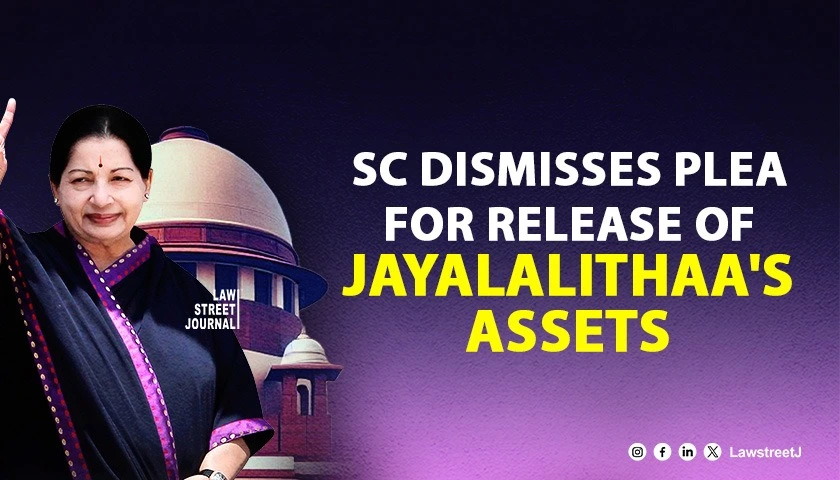NEW DELHI: The Supreme Court on Friday dismissed a plea for release of seized assets by Tamil Nadu Chief Minister J Jayalalithaa, in breach of the check period in the disproportionate assets case, saying the abatement of the proceedings against her due to her demise does not mean that she has been acquitted in the case.
Supreme Court Upholds Confiscation of Jayalalithaa’s Assets in Disproportionate Assets Case
A bench of Justices B V Nagarathna and Satish Chandra Sharma found no any merit in the plea filed by J Deepa, a legal heir of Jayalalithaa, against the Karnataka High Court's order of January 13, 2025.
On behalf of the petitioner, advocate M Sathya Kumar, said gold and silver items earned by Jayalalithaa during her acting career and those gifted by her mother must be returned back as it is unlawful to seize those assets. He said those properties were acquired beyond the check period.
Legal Heir’s Plea for Release of Jayalalithaa’s Seized Properties Dismissed by Supreme Court
"We don't know, how would you identify which items were acquired in breach of check period," the bench said.
The court also pointed out the previous 2027 judgment by this court in her case restored the trial court's judgment in toto and proceedings got abated due to her death only.
Also Read: Legal heir of Jayalalithaa moves SC for release of her assets
"Having regard to the observations of this court in the (2017) judgment in the 'State of Karnataka Vs J Jayalalithaa' to the effect that the proceedings before this court stood abated as she has died in the meanwhile, it should imply that further consideration of the case with regard to the correctness of the judgment of the High Court, acquitting the accused number 1 would not be taken further by this court. However, abatement would not imply that the judgment of the High Court has attained finality," the bench said.
The petition before the court contended since the proceedings in the criminal case stood abated in terms of judgment by this court in 2017, Jayalalitha cannot be treated as a convict resulting in the confiscation of properties seized by the prosecution.
"The properties under seizure are to be returned by lifting the attachment order," the plea said.
Following the acquittal order of High Court on May 11, 2015, Jayalalitha passed away on December 05, 2016 i.e., before the judgment of this court on February 14, 2017.
"Thus, all the proceedings against Jayalalitha stands abated and there is no presumption of guilt based on the conviction and sentence passed by the Special Court," it said.
The plea also stated it is settled principle that with the death of an acquitted person, the appeals against acquittal shall abate and there is no question of restoration of conviction, sentence and the fine imposed by the Special Court.
The petitioner stated she is the one of legal heir of Jayalalitha in terms of judgment of the Madras High Court of May 27, 2020, along with her brother.
The petitioner challenged the High Court's judgment of January 13, 2025 and also of the Special Court's order of January 29, 2025, directing the authorities to hand over the properties to the state of Tamil Nadu.
The High Court, in its order, had noted that the apex court had set aside the acquittal order passed by the Karnataka High Court with a clear finding that the order of confiscation and other directions has to be adhered to by all concerned, including the legal representatives of deceased.
The High Court had also said that further interpretation of the apex court's judgment in the appeal proceedings is impermissible since the top court had said that the trial court order is restored in full including consequential directions, even though Jayalalithaa died during the pendency of the appeal.
The plea contended that the High Court has erroneously discharged the prosecution from the onus of segregation of assets which was seized by the prosecution before the check period and during check period assets. “The Prosecution having got all the data and relevant documents pertaining to the period in question, it is the appropriate authority to segregate the assets based on the check period. The burden of proving that an asset was acquired before the check period cannot be shifted to the petitioner," the plea said.















